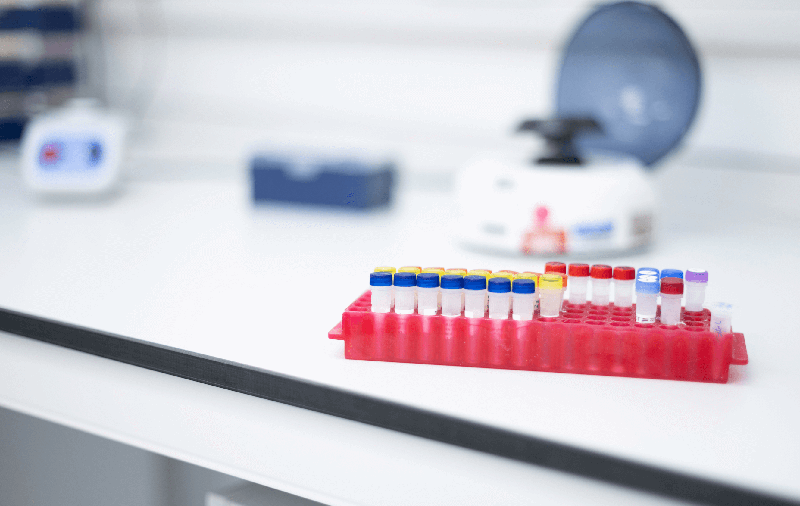
Reagents to make your own Master Mix
Not seeing what you’re looking for? Inquire about a new product
Premium PCR Enzymes & Master Mixes for Superior Assays
- High quality enzymes.
- Optimized buffers.
- Enzymatically synthesized, ultra-pure nucleotides, sets and mixes.
- DNA and RNA extraction controls.
Meridian offers a selection of high-quality enzymes designed to help you develop highly sensitive assays. Ready-to-use PCR and high-fidelity PCR enzymes, DNA polymerases, isothermal polymerases and RNA polymerases have been developed for fast amplification and superior sensitivity and yield. Glycerol-free and high concentration options allow drying or the enzymes for ambient temperature shipping and storage, extended shelf-life, and increased flexibility in sample volume. Meridian also has a selection of reverse transcriptases and next generation sequencing enzymes as well as buffers that has been designed to be combined with our high-quality enzymes to produce outstanding assay results. We are a primary manufacturer of ready-to-use sequencing grade ultra-pure nucleotides, sets and mixes, enzymatically synthesized from premium quality raw materials and supplied as lithium or sodium salts and positive controls for different steps within an MDx assay process (e.g. extraction, reagent performance, PCR cycling).
Catalogs & Brochures
Reagent Solutions for Molecular Diagnostics Reagent Solutions for Molecular Diagnostics
Glycerol is used with most enzymes as a cryoprotectant and stabilizer. The presence of hydroxyl groups disrupts the hydrogen bonding between water molecules and preventing the formation of ice crystals during freezing that can damage enzymes. A composition containing 50% glycerol having a freezing point to as low as -22˚C.
Glycerol tends to persist as a plasticizer or excluded liquid layer during drying – impeding the drying process, concentrations above 0.1% are generally incompatible with lyophilization.
Highly concentrations help 1/ reduce volumes when drying down, making the process faster, 2/ reduces volumes in microfluidic and cartridges, 3/ increases sample volume, 4/ facilitates optimization, 5/ speed up the reaction (as long as there is substrate available to bind to), 6/ increases sensitivity and yield and 7/ increased tolerant to inhibitors. As a result, they can be employed in a wide range of assay formats, allowing more flexibility for development and cost saving during commercialization.
These terms refer to parameters to be considered when performing when testing PCR enzymes. Yield: The amount of DNA produced in a PCR reaction. High yield increases sensitivity. Fidelity: The accuracy of the enzyme at incorporating the correct dNTP to the elongating DNA strand. For standard PCR this is not important, but for sequencing or expression a high-fidelity may be required. Processivity: The length of time a polymerase is associated with the template and therefore the size of fragment which can be amplified (the amplicon). Specificity: A measure of the unwanted by-products generated in a reaction. This is the reason for having hot start PCR, this prevents miss-priming at low temperatures and non-specific amplification.
For RNA with very high secondary structure, we recommend using 55C MMLV-RT (MDX117), this is a low glycerol reverse transcriptase that can be used at temperatures up to 60°C which improves the cDNA yield from difficult RNA targets that require higher temperature to denature strong secondary structures.
The enzymatic synthesis of dNTPs uses highly specific enzymatic systems which eliminate impurities and PCR inhibitors, such as modified nucleotides, PPi, and deoxynucleoside tetraphosphates. PCR reactions are impeded by the presence of contaminants resulting from chemical manufacturing processes, such as traces of dNDPs, pyrophosphate, or other ionic species (e.g. acetate). Such contamination may lead to poor yields or to no PCR product at all. Unless thoroughly purified, chemically synthesized dNTPs often contain deoxynucleoside tetraphosphates which are powerful PCR inhibitors. Chemical synthesis can also lead to deamination and other nucleotide modifications whereas enzymatic synthesis of dNTPs bypasses these risks.
It is stable for up to 2 years at ambient temperature if correctly stored in sealed pouches.
No, our lyo-excipients are proprietary, if you require a buffer that contains lyo-excipients, we have the Lyo-Ready qPCR Buffer, 2.5x (MDX022).
Get In Touch With A Specialist
Have questions about a product? Want to learn more about Meridian’s molecular or immunoassay reagent portfolio? We want to hear from you!